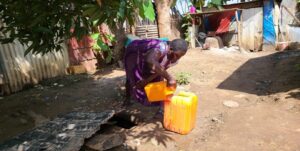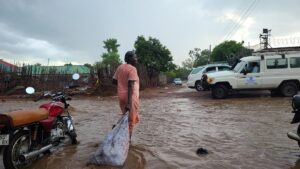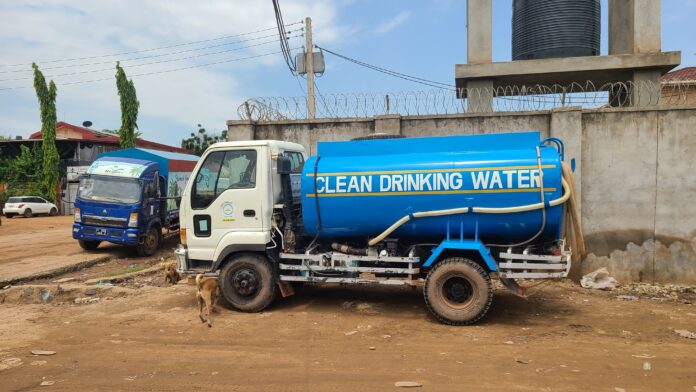By: Rita James
The 28-year-old Stella Ataya, a resident of Na Bari, in Juba wakes up each day with task of securing safe drinking water for her family. Her family relies on a communal tank and a home-dug well.
In this area, a drum of water costs 4,000 South Sudanese pounds—approximately $2—which strains her household budget. The rainy season complicates matters further; water tankers often avoid their area due to poor road conditions.
“We get our water through the water tank, but sometimes we face challenges because when the water tankers come to us, they either bring the water directly from the river or from tap water,” Stella explains.
Ataya and her villagemates, can only determine the water’s source once it’s poured into their drums, and sometimes, they see dirty water with visible green particles. She laments whether it is the tank or the hose that is contaminating their supply.
“We can only know when they pour the water into the drum, then we can identify it. Sometimes the water is dirty, so we don’t know whether it’s the tank that is dirty or the hose,” she adds.
In South Sudan, survival is a daily struggle, particularly for women. Obtaining safe drinking water is hard, as water is connected to every aspect of human day-to-day activities, directly or indirectly. At a basic level, everyone needs access to safe water in adequate quantities for drinking, cooking, personal hygiene, and sanitation facilities that do not compromise health or dignity. Therefore, access to safe and dependable clean and fresh water is a fundamental human right.
The United Nations (UN) and other countries declared that “access to clean, safe drinking water is a basic human right and an essential step toward improving living standards worldwide.
Despite these facts, there are still inequalities in access to safe drinking water in South Sudan and in the world; the problem has a greater impact on the poor, women, and children. There are also inequalities within and among nations.
According to the 2024 United Nations (UN) World Water Development Report, safe drinking water and sanitation are human rights. Without access to these services, a life of dignity, stability, and good health is virtually impossible. Water, when managed sustainably and equitably, can be a source of peace and prosperity. It is also the literal lifeblood of agriculture, the major socio-economic driver for billions of people.
It can promote community stability and peacebuilding—especially in fragile situations—and contribute to migration management and disaster risk reduction. But when water is scarce, polluted, or difficult to access, food security can be undermined, livelihoods lost, and conflict can follow.
South Sudan faces significant challenges in providing adequate sanitation services, including safe drinking water. The country faces enormous water, sanitation, and hygiene challenges, which cause poor health, including malnutrition, school absenteeism, loss of household income, and reduced workforce productivity.
In a report published by UNICEF South Sudan, access to basic water supply has fallen from 41% in 2010 to 39% in 2020. During the same period, access to adequate sanitation rose from 7% to 14%, while open defecation fell slightly from 71% to 63%.
According to UNICEF, fifty-nine percent of the population in South Sudan lacks access to safe water. To survive, families may be forced to drink dirty water, putting them at risk of waterborne diseases such as cholera and diarrhea, which remain leading causes of death among children in South Sudan. The situation is further aggravated by poor hygiene practices, as just 10 percent of the population has access to improved sanitation.
Just like Ataya, Susan Wani, a resident of Jebel Timan, laments that the cost of a drum of water in her neighborhood increased to 7,000 South Sudanese pounds, approximately $2, on August 1st, this year. She also mentions that water tankers visit their area two or three times a week, making it necessary for most residents to rely on well water for cooking and other household needs.
“The water tankers don’t come here every day; it takes two or sometimes three weeks for the water tankers to come here, so getting water is very hard,” Wani explains
Wani further explains that the water tankers deliver both clean and unclean water. She states that some tankers fill their water directly from the river, while others obtain it from taps. Additionally, she points out that the hoses used by the water tankers are often dirty.
Wani appeals to the national government to provide them with clean drinking water and boreholes.

Likewise, Joseph Ladu, a resident of Gurei, states that they get water from water tanks and boreholes. However, he expresses distrust in the water tank, explaining that when they pour the water, dirty particles are often visible, making the water look unclean.
“In this side of Gurei, we get water from the water tank and sometimes from the borehole. I don’t trust the water tank; they say it’s clean, but for me, it’s not clean because when you pour the water, you will see some dirty particles, and then you will have to leave it for some time before using it,” says Ladu.
Ladu further explains that due to a lack of trucks for waste collection, they keep their waste in their houses for some time before taking it to the drainage to dump.
Consequently, when it rains, the waste is carried directly to the river, and unfortunately, this water is then “brought back” to the citizens for “consumption through the water tank.”
He appeals to the national government to monitor the water tankers and properly check the hoses and tanks to ensure that clean water is distributed to the citizens.

The Mayor of Juba city council on Wednesday, 26/09/2024 issued orders introducing new water prices in Juba and its environment at cost of 2500 South Sudanese Pounds —approximately $— within the three blocks of the city council, and 3500 South Sudanese pounds —approximately $2—for areas far from the city.
the new water prices issued by the mayor Johnson Sakwa , acts as a way for the vulnerable citizens to access clean and safe drinking water from water suppliers and within the 120 water stations in Juba.
This follows public outcry over the high cost of water in Juba that triggered the public to resort to drinking dirty water from the wells and streams.
In an interview with Khamis Kennedy, a Water tanker driver, supplying water around juba, said, they are supplying 100% clean and safe drinking water fully purified from all the water collecting points constructed by JICA around the city.
“we are supplying one hundred percent (100%) clean and safe purified drinking water across the city because all the water we are supplying are directly collected from the water collecting points installed by JICA and they are safe to the citizens compared to before were we collects water directly from the nile,” Kennedy said
Kennedy revealed that, their water tankers are clean and the citizens should not think that they are not cleaning their tankers, they clean the tankers trice every week.
“Our water tankers are clean and safe for transporting clean water to the citizens because we make sure that every week we have to clean the tankers at least twice for the safety of our citizens and their access to clean water across the city.” He added
However at the end of January 2023, a new water treatment system was constructed by the cooperation of JICA in Juba, the capital of South Sudan. Approximately 400,000 Juba residents now have access to affordable, clean water through newly installed public taps and other means.
The new water treatment plant has the capacity to purify 10,800 cubic meters of Nile River water every day. Citizens can purchase water at 120 newly constructed public taps and eight water tanker stations in the city. An estimated 400,000 citizens now have access to clean and safe water, more than 10 times the number compared to that before the water treatment plant was completed.
According to UN-Water’s summary progress update for 2021, https://events.unesco.org/event?id=978261025&lang=1033 contaminated water and poor sanitation are linked to the transmission of diseases such as cholera, diarrhea, dysentery, hepatitis A, typhoid, and polio.
Absent, inadequate, or poorly managed water and sanitation services expose individuals to preventable health risks. This is particularly true in healthcare facilities, where both patients and staff face additional risks of infection and disease when water, sanitation, and hygiene services are lacking.
Dr. Teri Alex, a medical officer at Juba teaching hospital, notes that “one of the health risks is the parasite that we get from drinking untreated water. When we drink untreated water, we can get typhoid fever and abdominal problems that cause stomach pain due to parasites like filarial disease.”
He advises the Juba city council to supervise and ensure that all the water tankers delivering water provide clean water. He also wants the council to implement laws that penalize anyone found dumping rubbish by the roadside or into running rainwater, urging everyone to follow the law for a healthier community.
“Health is made at home and only repaired in healthcare facilities when it breaks down,” insists Dr Teri.
Between June and August, this year, water prices in Juba increased significantly, with residents complaining that they sometimes go to bed without safe drinking water, forcing them to dig wells in their houses for survival. The concerned authorities have yet to address this issue.
South Sudan has experienced profound effects of climate change over the last four years, intensifying water-related difficulties.
According to an April 2023 report https://www.wfp.org/news/climate-crisis-drives-malnutrition-south-sudan-unprecedented-levels-flood-affected-areas-wfp by the World Food Program, South Sudan was listed among the top eight countries worldwide most affected by climate change, particularly concerning the heightened risk of floods, which is expected to worsen the situation further. The World Bank has ranked South Sudan as the seventh most vulnerable country globally to these climate shifts.
Recently, the economic cluster, led by Vice President Dr. James Wani Igga, announced a $9 million budget allocation to purchase hundreds of water tanks, aiming to alleviate current water shortages and reduce prices in towns.
Most local media, including Eye Radio, reported on this development. However, this move faced widespread criticism from the public and civil society groups, with demands to prioritize household pipe connections over water tank purchases.
But all is not lost, three months ago, the President of South Sudan, Salva Kiir Mayardit, signed the country’s Heads of State Initiative Compact on Water and Sanitation, marking a major milestone to ensure the rights of all citizens to water, sanitation, and hygiene (WASH). This move is significant step forward in improving the water and sanitation situation in South Sudan.
The WASH Compact stems from the global UN Water Conference in March 2023, held in New York. It is built upon clear commitments that encompass increased budget allocations, innovative sources of financing, and comprehensive plans for the construction of vital water and sanitation infrastructure.
This story was produced with support from InfoNile

